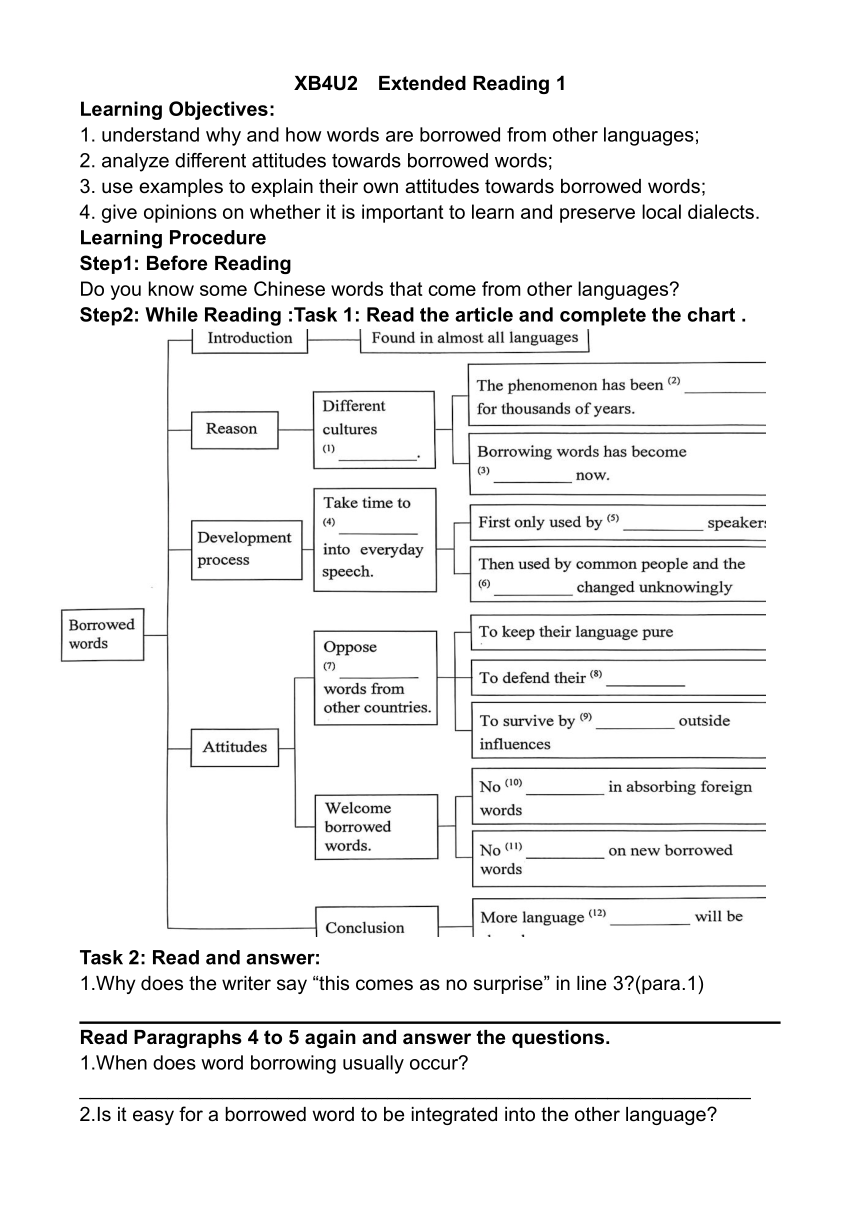Unit 2 Understanding each other Extended reading导学案(无答案) -2024-2025学年高中英语牛津译林版(2020)选择性必修第四册
文档属性
| 名称 | Unit 2 Understanding each other Extended reading导学案(无答案) -2024-2025学年高中英语牛津译林版(2020)选择性必修第四册 |  | |
| 格式 | docx | ||
| 文件大小 | 399.2KB | ||
| 资源类型 | 教案 | ||
| 版本资源 | 牛津译林版(2019) | ||
| 科目 | 英语 | ||
| 更新时间 | 2025-02-07 23:06:21 | ||
图片预览

文档简介
XB4U2 Extended Reading 1
Learning Objectives:
1. understand why and how words are borrowed from other languages;
2. analyze different attitudes towards borrowed words;
3. use examples to explain their own attitudes towards borrowed words;
4. give opinions on whether it is important to learn and preserve local dialects.
Learning Procedure
Step1: Before Reading
Do you know some Chinese words that come from other languages
Step2: While Reading :Task 1: Read the article and complete the chart .
Task 2: Read and answer:
1.Why does the writer say “this comes as no surprise” in line 3 (para.1)
Read Paragraphs 4 to 5 again and answer the questions.
1.When does word borrowing usually occur
_____________________________________________________________
2.Is it easy for a borrowed word to be integrated into the other language
_____________________________________________________________
Read Paragraphs 4 to 5 again and complete the following table.
Attitude Reasons Example Result
________ (Para.4) Defending their own identity French Keeping their native language ________
_________________ _________________ Native American Navajo ______________ outside influences
Optimistic (Para.5) Accepting the fact that English _________________
_________________ The English-speaking community ________________ ___________________ 2.Ensuring a more ________ language 3._________________ ___________________
Step3: Post Reading Do you think it is important to learn and continue using local dialects in today’s increasingly connected society Why or why not
_______________________________________________________________
Step4: Consolidation:Read the magazine article and fill in the blanks.
The phenomenon of word borrowing can 1._________ (see) in almost all languages. It happens when two cultures with different languages interact, and especially when the native language has no 2.____________ (suit) word for an object or idea.
In the current age of globalization, with cultural exchange growing, words 3. ___________ (relate) to technology fields are more likely to be borrowed directly from the source language at a(n) 4.__________ (fast) pace than before. However, the process of borrowing words is still complicated, and 5. _____ takes time for new words to be used in daily life and sound like the native language.
Borrowed words are an unavoidable outcome of language development. However, some language communities refuse 6. ____________(accept) words from other cultures. For example, the French have 7.___________ (specific) established an organization to create new words and avoid borrowed words. On the contrary, some language communities are optimistic 8.________ the language exchange, and English is such a language9._________ (absorb) plenty of foreign words into its daily vocabulary. Borrowed words can not only show the language' s vitality, 10.________ also help the communities share new ideas and different beliefs.
As the world is becoming more and more globalized, more language characteristics will be shared between nations and cultures.
Learning Objectives:
1. understand why and how words are borrowed from other languages;
2. analyze different attitudes towards borrowed words;
3. use examples to explain their own attitudes towards borrowed words;
4. give opinions on whether it is important to learn and preserve local dialects.
Learning Procedure
Step1: Before Reading
Do you know some Chinese words that come from other languages
Step2: While Reading :Task 1: Read the article and complete the chart .
Task 2: Read and answer:
1.Why does the writer say “this comes as no surprise” in line 3 (para.1)
Read Paragraphs 4 to 5 again and answer the questions.
1.When does word borrowing usually occur
_____________________________________________________________
2.Is it easy for a borrowed word to be integrated into the other language
_____________________________________________________________
Read Paragraphs 4 to 5 again and complete the following table.
Attitude Reasons Example Result
________ (Para.4) Defending their own identity French Keeping their native language ________
_________________ _________________ Native American Navajo ______________ outside influences
Optimistic (Para.5) Accepting the fact that English _________________
_________________ The English-speaking community ________________ ___________________ 2.Ensuring a more ________ language 3._________________ ___________________
Step3: Post Reading Do you think it is important to learn and continue using local dialects in today’s increasingly connected society Why or why not
_______________________________________________________________
Step4: Consolidation:Read the magazine article and fill in the blanks.
The phenomenon of word borrowing can 1._________ (see) in almost all languages. It happens when two cultures with different languages interact, and especially when the native language has no 2.____________ (suit) word for an object or idea.
In the current age of globalization, with cultural exchange growing, words 3. ___________ (relate) to technology fields are more likely to be borrowed directly from the source language at a(n) 4.__________ (fast) pace than before. However, the process of borrowing words is still complicated, and 5. _____ takes time for new words to be used in daily life and sound like the native language.
Borrowed words are an unavoidable outcome of language development. However, some language communities refuse 6. ____________(accept) words from other cultures. For example, the French have 7.___________ (specific) established an organization to create new words and avoid borrowed words. On the contrary, some language communities are optimistic 8.________ the language exchange, and English is such a language9._________ (absorb) plenty of foreign words into its daily vocabulary. Borrowed words can not only show the language' s vitality, 10.________ also help the communities share new ideas and different beliefs.
As the world is becoming more and more globalized, more language characteristics will be shared between nations and cultures.
同课章节目录
